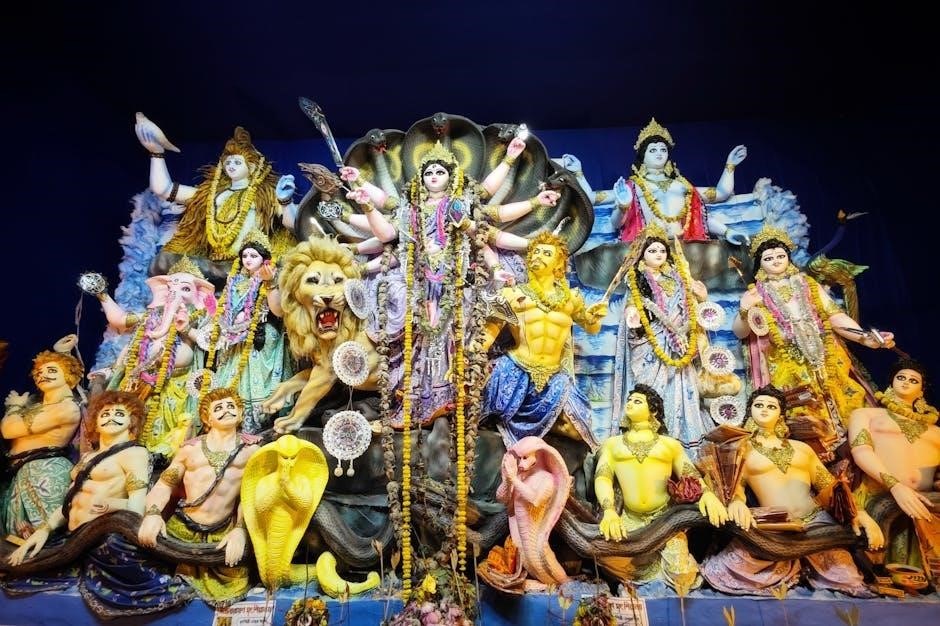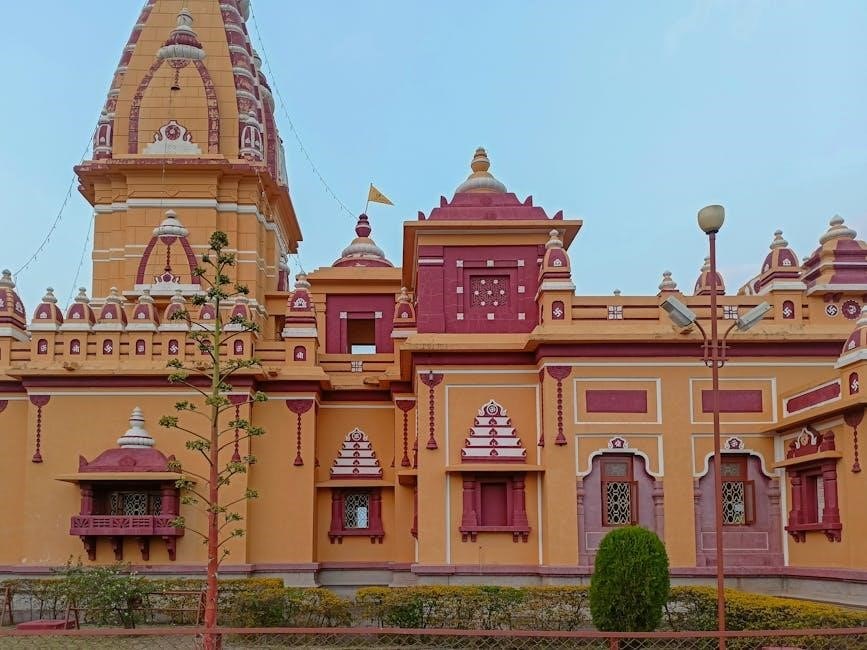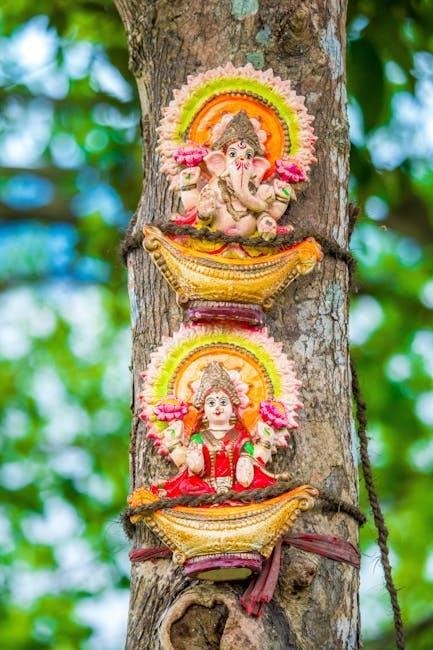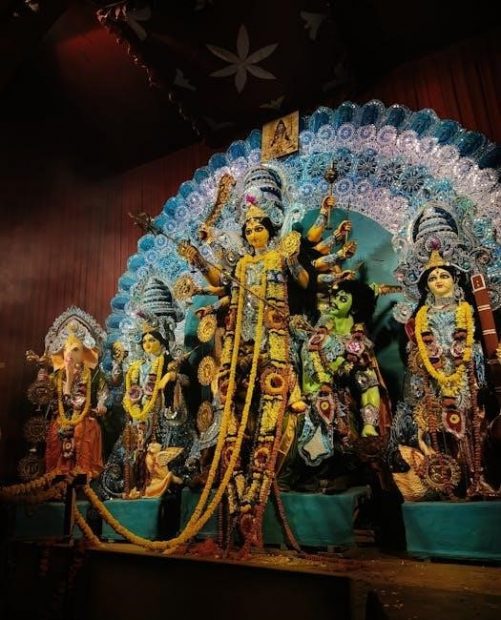The Ashta Lakshmi Stotram in Telugu is a sacred Hindu hymn dedicated to Goddess Lakshmi’s eight forms, symbolizing prosperity and spiritual growth. Widely recited in worship for blessings and positive energy.
Overview of the Hymn
The Ashta Lakshmi Stotram is a devotional hymn dedicated to Goddess Lakshmi, focusing on her eight divine forms. Each of its eight verses glorifies a specific aspect of Lakshmi, such as wealth, knowledge, and courage. The hymn is written in Telugu, a language deeply rooted in Hindu scripture and culture. It is widely recited in prayers and rituals to invoke blessings for prosperity, health, and spiritual growth. The stotram is believed to hold the power to overcome financial struggles and bring harmony to one’s life. Its verses are rich in meaning, offering both material and spiritual benefits to the devotees who chant it with faith and dedication.
Importance of Telugu Version
The Telugu version of the Ashta Lakshmi Stotram holds significant cultural and religious importance, especially in South India. Telugu, being a prominent language in Hindu scripture, connects devotees deeply with their spiritual heritage. This version is widely recited in daily rituals and is considered a powerful medium to invoke Goddess Lakshmi’s blessings. Its availability in Telugu makes it accessible to millions, allowing devotees to chant with ease and understanding. The hymn’s translation into Telugu preserves its sacredness and ensures its reach across diverse communities; It is a cherished resource for those seeking spiritual growth, prosperity, and inner peace through ancient devotional traditions.

The Eight Forms of Lakshmi
The Eight Forms of Lakshmi symbolize various aspects of wealth, prosperity, and divine blessings, each embodying unique qualities for devotees seeking spiritual growth and fulfillment.
Adi Lakshmi (The Primeval Lakshmi)
Adi Lakshmi, the Primeval Lakshmi, is the original and eternal form of Goddess Lakshmi. She represents the fundamental source of all wealth, prosperity, and spiritual knowledge. As the primal energy, she embodies the essence of creation and sustenance, often depicted as the consort of Lord Vishnu. Devotees worship Adi Lakshmi to seek her divine blessings for a stable and prosperous life. Her presence is believed to bring harmony and balance, dispelling darkness and negativity. The first verse of the Ashta Lakshmi Stotram is dedicated to her, praising her eternal and radiant form for conferring liberation and eternal peace.
Dhana Lakshmi (Wealth Lakshmi)
Dhana Lakshmi is the form of Goddess Lakshmi associated with material wealth and financial prosperity. She is revered as the deity who bestows abundance and good fortune, ensuring the fulfillment of desires. Dhana Lakshmi is often depicted holding a golden pot overflowing with wealth, symbolizing her role in granting monetary success and stability. Her blessings are sought by devotees to overcome financial difficulties and achieve economic stability. The second verse of the Ashta Lakshmi Stotram extols her virtues, emphasizing her power to eliminate poverty and bestow prosperity, thereby enhancing the quality of life for her devotees. Worshiping her is believed to attract wealth and ensure a life free from financial worries.
Dhanya Lakshmi (Grain Lakshmi)
Dhanya Lakshmi, the Grain Lakshmi, embodies the abundance of harvests and fertility of the earth. She is the deity of nourishment, ensuring fruitful agricultural endeavors and plentiful food supplies. Often depicted holding grains, Dhanya Lakshmi symbolizes the prosperity derived from the earth’s bounty. Her blessings are invoked to secure a bountiful harvest, sustain life, and eliminate scarcity. Worshiping Dhanya Lakshmi is believed to grant devotees the ability to cultivate and maintain resources, fostering a life of sustainability and abundance. Her significance lies in her role as a provider of sustenance, making her a vital aspect of daily life and spiritual well-being.
Gaja Lakshmi (Elephant Lakshmi)
Gaja Lakshmi, or Elephant Lakshmi, is revered as the embodiment of strength, prosperity, and good fortune. She is often depicted with elephants, symbolizing her power to bestow wealth and remove obstacles. Her presence is associated with the arrival of good fortune and the purification of life’s challenges. Devotees worship Gaja Lakshmi to seek blessings for strength, prosperity, and a stable life. Her divine energy is believed to protect against adversity and grant success in endeavors. This form of Lakshmi highlights the importance of perseverance and courage in achieving one’s goals, making her a significant figure in Hindu devotion and a protector of those who seek her grace.
Santana Lakshmi (Progeny Lakshmi)
Santana Lakshmi, the Progeny Lakshmi, is the divine form of Goddess Lakshmi who bestows blessings for a healthy and vibrant family life. She is worshipped by those seeking progeny, harmony, and the joy of parenthood. This form of Lakshmi is believed to grant couples the gift of children, ensuring their well-being and happiness. Santana Lakshmi’s blessings are also sought to maintain familial bonds and to foster a nurturing environment within the home. Her grace is considered essential for the continuation of lineage and the fulfillment of domestic bliss, making her a cherished deity among those desiring a loving and complete family life.
Vijaya Lakshmi (Victory Lakshmi)
Vijaya Lakshmi, the Victory Lakshmi, embodies the divine power of triumph and success. She is revered as the granter of strength, courage, and determination, enabling devotees to overcome challenges and achieve their goals. This form of Lakshmi is particularly worshipped by those seeking victory in personal, professional, or spiritual endeavors. Her blessings are believed to bring clarity of mind, strategic thinking, and the resilience needed to face adversity. Vijaya Lakshmi is also associated with the removal of obstacles, ensuring smooth progress in all aspects of life. Her divine grace is often sought before important events or decisions, as she is considered the embodiment of unstoppable success and eternal triumph. Worshipping her fosters a victorious spirit and a fulfilling life.
Vidya Lakshmi (Knowledge Lakshmi)
Vidya Lakshmi, the Knowledge Lakshmi, is the divine embodiment of wisdom and intellect. She is the bestower of knowledge, creativity, and mental clarity, guiding seekers on the path of enlightenment. This form of Lakshmi is particularly revered by students, scholars, and those pursuing intellectual or artistic endeavors. Her blessings are believed to enhance memory, focus, and the ability to discern truth from illusion. Vidya Lakshmi is often invoked to overcome ignorance and achieve academic or professional success. Her grace fosters a deeper understanding of the universe and oneself, leading to spiritual growth and inner peace. Worshipping her is believed to illuminate the mind and empower individuals with the wisdom necessary to navigate life’s challenges effectively. Her presence is cherished as a source of eternal knowledge and enlightenment.
Dhairya Lakshmi (Courage Lakshmi)
Dhairya Lakshmi, or Courage Lakshmi, embodies the divine strength and resilience needed to face life’s challenges. She is the granter of fearlessness, determination, and perseverance, enabling individuals to overcome obstacles and remain steadfast in their goals. This form of Lakshmi is particularly significant in times of adversity, offering the courage to act with confidence and resolve. Her blessings are sought by those seeking mental fortitude, emotional stability, and the ability to remain composed under pressure. Dhairya Lakshmi’s grace helps individuals rise above fear and doubt, fostering a strong will and unwavering determination. Her presence is a source of inspiration, empowering believers to embrace challenges with courage and emerge victorious. Her worship is believed to instill inner strength and resilience in the face of adversity, leading to a life of confidence and determination.

Benefits of Chanting Ashta Lakshmi Stotram
Chanting Ashta Lakshmi Stotram brings prosperity, wisdom, and health. It fosters financial success, spiritual growth, and inner peace, helping overcome life’s challenges and attain divine blessings.
Prosperity and Financial Success
Chanting the Ashta Lakshmi Stotram is believed to attract wealth and financial stability. It invokes Goddess Lakshmi’s blessings, ensuring prosperity and overcoming monetary hardships. The hymn, particularly through verses dedicated to Adi Lakshmi and Dhana Lakshmi, is known to enhance financial fortune and abundance. By reciting it, devotees seek to eliminate debt and gain material comfort. Its divine energy is said to create a positive aura, fostering success in business and personal endeavors. Many followers incorporate this stotram into daily rituals, believing it brings long-term financial security and prosperity. The Telugu version is widely cherished for its cultural resonance and spiritual potency in manifesting wealth.
Wisdom and Knowledge
Chanting the Ashta Lakshmi Stotram is believed to enhance wisdom and knowledge, particularly through the blessings of Vidya Lakshmi. This form of Goddess Lakshmi is revered as the embodiment of intellect and learning. Devotees recite the stotram to seek clarity of thought, improved memory, and academic success. It is said to inspire creativity and problem-solving skills, aiding individuals in overcoming mental challenges. Regular chanting fosters a disciplined and focused mind, essential for achieving goals in education and career. By invoking Vidya Lakshmi, one can attain spiritual and intellectual growth, leading to a life of purpose and enlightenment. The stotram’s verses are a powerful tool for nurturing wisdom and gaining a deeper understanding of life’s complexities.
Health and Well-being
The Ashta Lakshmi Stotram is also revered for its potential to promote health and well-being. By worshipping Goddess Lakshmi in her various forms, devotees seek protection from ailments and a life free from suffering. The stotram’s verses are believed to create a positive energy field, enhancing physical and mental health. Regular chanting is thought to bring balance to the body and mind, fostering resilience against diseases. Additionally, the divine blessings of Lakshmi are said to ensure longevity and vitality, allowing individuals to lead a fulfilling and joyful life. Many followers believe that reciting the stotram can alleviate health challenges and restore overall well-being, making it a cherished practice in daily worship.
Spiritual Growth and Inner Peace
The Ashta Lakshmi Stotram is a powerful tool for spiritual growth and attaining inner peace. By chanting the stotram, devotees connect with Goddess Lakshmi’s divine energy, fostering a deeper sense of spirituality and self-realization. The hymn’s verses are designed to purify the mind and soul, helping individuals transcend worldly distractions and focus on their inner selves.
Regular recitation of the stotram is believed to bring emotional balance and harmony, essential for spiritual advancement. It also strengthens one’s faith and devotion, leading to a more peaceful and purposeful life. Many followers find solace in the stotram’s teachings, which guide them toward enlightenment and eternal bliss, making it a cherished part of their spiritual journey.

Downloading the Ashta Lakshmi Stotram PDF in Telugu
The Ashta Lakshmi Stotram PDF in Telugu is easily accessible online, offering free downloads from various devotional websites and platforms like stotranidhi.com. It provides lyrics and meanings for convenient recitation and understanding.
Available Sources for Download
The Ashta Lakshmi Stotram PDF in Telugu is widely available on various devotional websites, including stotranidhi;com, which offers free downloads. Additionally, platforms like archive.org and scribd.com host this document for easy access. Many Hindu temple websites also provide downloadable versions of the stotram. Furthermore, religious apps such as Vedika and Devotional Songs often include the PDF for offline access. Users can also find the stotram on forums like IndiaDivine and TemplePedia, where members share sacred texts. These sources ensure that devotees can conveniently access and recite the hymn in its purest form, aiding in their spiritual practices and daily worship routines.
Steps to Download the PDF
To download the Ashta Lakshmi Stotram PDF in Telugu, visit reputable websites like stotranidhi.com or archive.org. Search for “Ashta Lakshmi Stotram Telugu PDF” in the search bar. Select the appropriate link from the results, ensuring it is a trusted source. Click the “Download” button, usually found near the document preview. Some platforms may require free registration or verification. Once downloaded, save the PDF to your device for easy access. Additionally, many temple websites and devotional apps like Vedika offer direct download options. Always verify the authenticity of the source to ensure the text is accurate and free from errors.

Cultural and Religious Significance
The Ashta Lakshmi Stotram holds profound cultural and religious importance in Hindu tradition, revered for its ability to invoke Goddess Lakshmi’s blessings, fostering prosperity and spiritual harmony.
In Hindu Scripture and Tradition
The Ashta Lakshmi Stotram is deeply rooted in Hindu scripture and tradition, venerating Goddess Lakshmi as the embodiment of prosperity and divine grace. Originating from ancient Vedic texts, this hymn is a cherished part of Hindu devotional practices, often recited during rituals and ceremonies to invoke Lakshmi’s blessings. Each of its eight verses honors a distinct form of the goddess, symbolizing various aspects of wealth and well-being. The stotram is considered sacred, believed to bring financial success, wisdom, and spiritual harmony to those who chant it with devotion. Its verses are also integral to daily worship in many Hindu households, reflecting its enduring cultural and religious significance.
Role in Daily Worship and Rituals
The Ashta Lakshmi Stotram holds a significant place in daily Hindu worship, often recited during puja ceremonies and rituals to seek Goddess Lakshmi’s blessings. Devotees chant it to invoke prosperity, peace, and harmony in their lives. The hymn is frequently recited during festivals like Diwali and Navaratri, considered auspicious occasions to worship Lakshmi. Many households include it in their daily prayers, believing it brings positive energy and financial stability. Temples and spiritual gatherings also feature this stotram, emphasizing its role in collective worship. Its melodic and devotional nature makes it a popular choice for rituals, fostering a deep connection with the divine and promoting a sense of calm and fulfillment among believers.

Structure and Verses of the Stotram

The Ashta Lakshmi Stotram comprises eight verses, each glorifying a distinct form of Goddess Lakshmi. The hymn is written in Telugu, with each verse dedicated to a specific aspect of Lakshmi, invoking her blessings for prosperity and spiritual growth.
Number of Verses and Their Meanings
The Ashta Lakshmi Stotram consists of eight verses, each dedicated to a specific form of Goddess Lakshmi. Each verse intricately describes her divine attributes and blessings. The first verse praises Adi Lakshmi, the primordial form, while subsequent verses honor Dhana Lakshmi, Dhanya Lakshmi, Gaja Lakshmi, Santana Lakshmi, Vijaya Lakshmi, Vidya Lakshmi, and Dhairya Lakshmi. Each verse is rich in meaning, symbolizing wealth, prosperity, knowledge, and courage. Chanting these verses is believed to bring harmony, success, and spiritual enlightenment. The hymn’s structure ensures a comprehensive worship of Lakshmi’s diverse forms, making it a powerful tool for devotees seeking her grace and blessings in various aspects of life.

How to Incorporate into Daily Life
Chant the Ashta Lakshmi Stotram daily for positivity and focus. Practice during meditation or morning routines to invoke Goddess Lakshmi’s blessings for a peaceful and prosperous life.
Chanting Techniques and Best Practices
Chanting the Ashta Lakshmi Stotram with devotion and focus enhances its spiritual benefits. Ideal times are early morning or evening during puja. Sit comfortably in a clean, serene space. Use a puja setup with Goddess Lakshmi’s image, flowers, and incense to create a sacred atmosphere. Recite the hymn with clarity,pronouncing each word correctly. Understanding the meaning deepens the connection. Chanting regularly, even daily, fosters consistency and amplifies positive energy. Maintain concentration to avoid distractions. This practice not only invokes Goddess Lakshmi’s blessings but also brings mental calm and focus to daily life;
